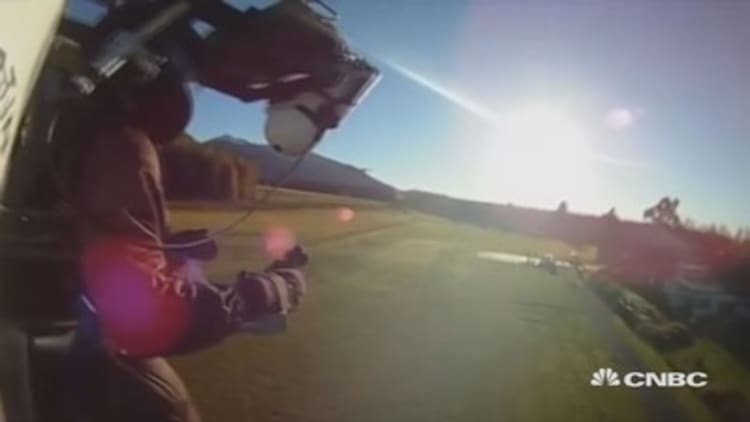
Long the preserve of science fiction and spy movies, the jetpack could soon be flying above us if a New Zealand manufacturer has its way.
Martin Aircraft has been developing a prototype jetpack that will reach speeds of up to 74 kilometers an hour (45 mph). Dubbed the Martin Jetpack, and retailing for $200,000, a prototype was on show at this year's Paris Air Show.
Read More Could you be surfing at high-speed in the skies?
The company believes that the jetpack would be best suited for emergency workers and would be ideal in helping in disaster relief.
"We've developed this for our first responders, fire, police, natural disaster and recovery," Peter Coker, CEO of Martin Aircraft told CNBC.
Martin explained that the pack is powered by "ducted fans driven by an engine power plant of V4 two stroke engines."
"It creates a lot of air and then we're able to move the aircraft around by guiding it over certain vanes where it can actually get up to about 74 kmh."
The company believes that the jetpack will be available for use from next year.
"We're moving to a commercial product so we can release it in the second half of 2016 so right now we are taking the prototype and adding the commercial aspects to it." Coker said.
Read More Rare look inside test plane
"So we're redesigning it, looking at the supply chain and generally getting ready for commercialisation."
The company isn't the first to try and develop a jetpack system. Bell Aerosystems was one of the first companies to develop such a device with the U.S. Army during the 1960s. Tecnologia Aerospacial is another company which currently sells a jet pack system.
But Martin Aircraft say that what makes their different is that it's currently classed as a light aircraft, This will make clearing regulatory hurdles much easier, the company claims.
"It's registered as a microlight aircraft with the new Zealand Civil Aviation Authority so that makes it easy for us because a lot of other countries around the world are recognising that for us," Coker said.
"We actually have a team looking at the regulatory requirements, but we don't see it as a big issue and a lot of them are asking us to write up the rules because there's nothing like this in the world. "




